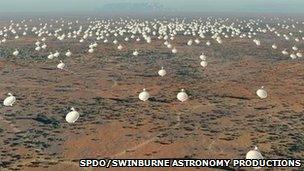Jodrell Bank chosen as base for largest radio telescope
- Published

An artist's impression of telescope dishes at the heart of the network
Jodrell Bank Observatory in Cheshire has been selected as the headquarters for a £1.3bn project to build the world's biggest radio telescope.
An agreement to run the Square Kilometre Array from Jodrell Bank was signed in Rome by Australia, China, the Netherlands, New Zealand, South Africa, France, Germany, Italy, and the UK.
SKA is designed to answer some key questions about the Universe.
Its location is undecided but could be built in Australia or Southern Africa.
Alien life
The new headquarters at Jodrell Bank will open in January 2012, superseding the existing project office at the University of Manchester.
The observatory has been responsible for some hugely important astronomical discoveries since it was established after the Second World War, but there have been doubts over its future in recent years due to constant funding worries.
Hosting the project office for the Square Kilometre Array could see 60 jobs created there over the next four years.
Professor Richard Schilizzi, director SKA, said: "The move to Jodrell Bank Observatory comes at a crucial time as the project grows from a concept to an international mega-science project.
"The new location and facilities will support the significant expansion that is planned."
The Square Kilometre Array takes its name from the size of its collecting area. But instead of a single radio dish 1km across, it will be made up of thousands of smaller ones.
The total collecting area will be approximately one square kilometre giving 50 times the sensitivity, and 10,000 times the survey speed, of the best current-day telescopes, the SKA project said in a statement.
So far, partners from 20 countries are involved in the 1.5bn euros (£1.3bn) project. Construction could begin by 2016, with the telescope expected to be complete by 2024.
It is hoped the array will reveal how planets and galaxies are born, give clues the nature of dark energy and help to detect signs of alien civilisations.
Professor John Womersley, chair of the SKA Founding Board, said: "Given the current economic environment, it is reassuring that so many partners have recognised the importance of supporting the SKA.
"Our partners have taken this step not only because of the inspirational nature of the discoveries that the SKA will make, but also because of the economic benefits that international mega-science projects can bring to participating countries."
- Published31 March 2011